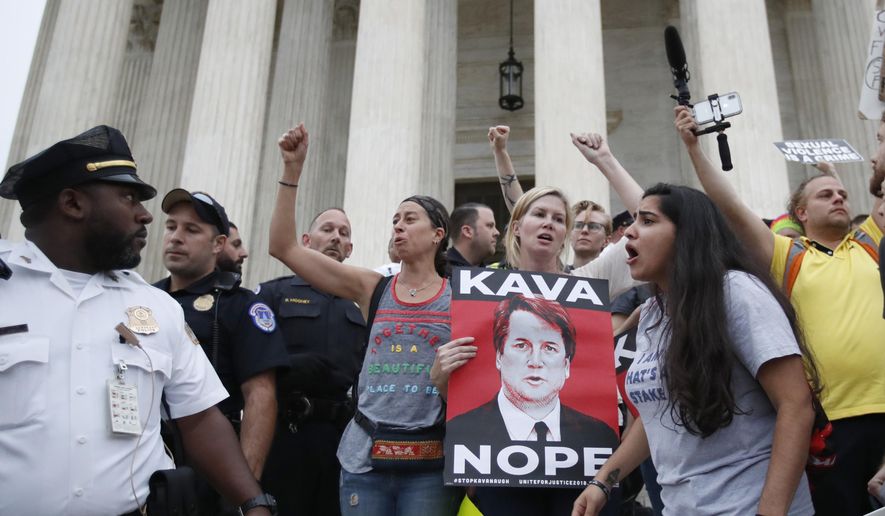Exercising free-speech rights on college campuses generally isn’t an easy thing for conservative students to do these days — not even, it turns out, in deep-red Texas.
Conservative student groups at University of Texas campuses in Austin and San Antonio said attempts to intimidate, harass and shut down free speech hit a new low last week when mobs of left-wing students attacked supporters of the Supreme Court nomination of Judge Brett Kavanaugh.
At the flagship Austin campus, a mob descended on a table manned by members of the Young Conservatives of Texas (YCT), forcibly taking “Confirm Kavanaugh” signs and destroying pro-Kavanaugh pamphlets. Online videos of the fracas drew more than 1.1 million views and the conservative students were later “doxxed” (identified and singled out online for further harassment and threats).
“They were just shrieking and screaming,” said Saurabh Sharma, chairman of the Young Conservatives of Texas (YCT) chapter at UT Austin. Mr. Sharma said the crowd threw water and snatched at the “Make America Great Again” hat of a member, but stopped short of throwing punches.
In one video, Mr. Sharma can be seen trying to move away from an enraged woman who has come behind the group’s table and begun wordlessly grabbing signs out of students’ hands and ripping them apart. She grasps at Mr. Sharma’s sign that says, “No campus kangaroo courts in Congress.”
“Excuse me, ma’am, are you trying to assault me?” he can be heard asking, as he retreats. An administrator finally steps between the two.
The mobs trying to restrict the free speech rights of the groups have not drawn any reprimand from administrators, according to students in Austin and San Antonio. That indifference stands in contrast to schools’ treatment of anti-Kavanaugh groups on campuses across the country — Yale Law School and the University of Vermont, among others, canceled classes to facilitate protests organized by the left-wing groups, and faculty have expressed their support.
Mark Pulliam, a University of Texas Law School alumnus who says the outbursts are the latest embarrassment for his alma mater. “It was clear UT was going in the wrong direction and it just keeps going in the wrong direction,” he said.
Mr. Pulliam was especially distressed by the anti-Kavanaugh incidents, which drew considerable media coverage and, in the process, subjected the university to what he called, “widespread derision.”
On the San Antonio campus, the response to a free-speech table set up by the Young Americans for Freedom chapter was also frightening, said YAF leader Peyton Dillberg.
“There was the general nastiness you see with this kind of crowd, but it looked like people wanted to hit us for sure,” he said.
One YAF member was nearly assaulted by students who snatched his hat and destroyed it. Afterward, more than a half dozen YAF members were doxed, Mr. Dillberg said, and a flier was distributed claiming the member who had his hat taken had initially slapped someone in the crowd.
“That is absolutely 1,000 percent false,” Mr. Dillberg said, noting the anonymous flyer was also put up on a video screen at class Thursday afternoon by a psychology professor.
At a regularly scheduled meeting Wednesday night, Mr. Sharma said there was “a more pronounced police presence than normal,” but that the group nevertheless signed up 28 new members.
The conservative groups aren’t strangers to campus controversy. The YCT chapter at UT Austin made headlines in previous years with things like their bake sale which charged different cookie prices to illustrate what YCT considers the bizarre nature of affirmative action.
UT President Gregory L. Fenves has not spoken publicly about the incidents, but on Wednesday a statement was issued by Leonard N. Moore, a vice president for Diversity and Community Engagement.
“Yesterday’s events are a reminder that our university has a highly engaged student body,” Mr. Moore wrote. “Given the importance of debate and intellectual exchange, I believe all student organizations and individual students have a right to express their opinions on campus.”
Mr. Moore noted “all members of our community deserve to be treated with respect and dignity,” before saying more work needs to be done for victims of sexual assault.
The university’s official response doesn’t sit well with conservatives like Mr. Pulliam.
“A group of hoodlums assault UT students, exposing us to widespread derision,” he wrote. “No statement from the UT president denouncing the incident. Instead, the response is THIS? To call this tepid statement inadequate would be an understatement.”
A month ago, Mr. Pulliam launched a Facebook page called “Stop the Insanity at UT” that is nearing 1,000 members, a benchmark he said would be sufficient to bring attention to Texas legislators who control the university’s purse strings.
The problem, according to Mr. Pulliam, is not that left-wing professors are “spouting agit-prop” in the classroom as much as those same radical positions then finding their way to the school’s official website and press releases, thereby giving them the university’s imprimatur.
In the past, “either because they want their kids to get in to UT or they just want season tickets,” Mr. Pulliam said elected officials who control the UT purse strings have been more concerned with the fate of the football team than the liberal arts, but that situation needs to change if the school’s public universities are to provide an intellectual framework for all the state’s residents.
“UT should not be trying to emulate Yale,” he said, noting Mr. Kavanaugh’s alma mater which has also sought to disassociate itself from the incoming Supreme Court justice.
• James Varney can be reached at jvarney@washingtontimes.com.




Please read our comment policy before commenting.